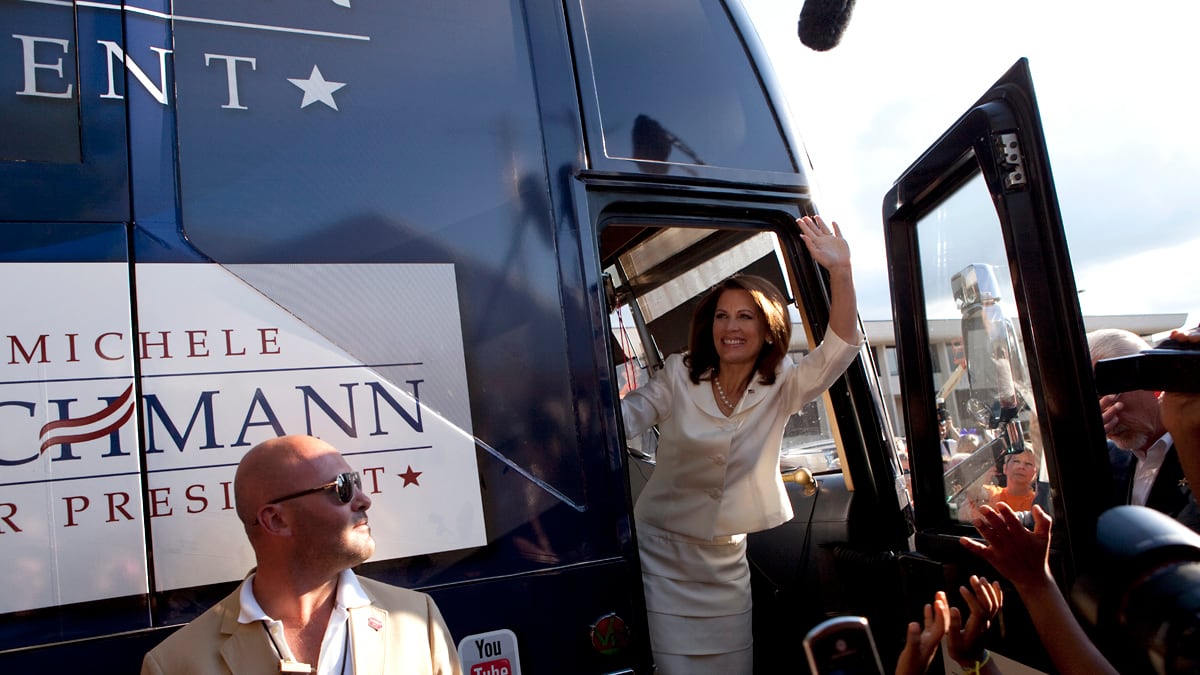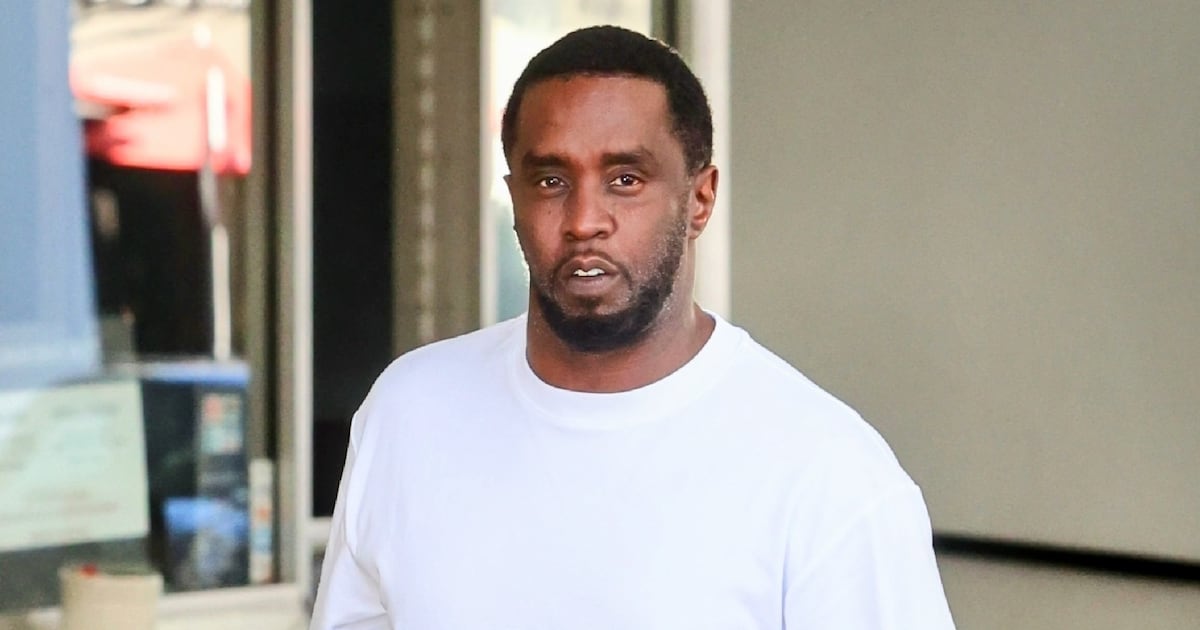Michele Bachmann edged Ron Paul in a near-draw in Saturday’s Iowa straw poll, a triumph for two Republican House members known more for passion than legislation. But the real winner of the weekend was Rick Perry—who declared his candidacy for the Republican nomination from a remote location 1,200 miles from Ames.
The most disappointed person in Ames was Tim Pawlenty, who placed a distant third with 2,293 votes, or 13.6 percent of nearly 17,000 votes cast. “We are just beginning, and I’m looking forward to a great campaign,” Pawlenty said in a statement after the results were announced. But GOP strategist Gentry Collins, asked by The Daily Beast what the former Minnesota governor should do next, responded: “Graceful exit.” And within hours, Pawlenty did just that—saying in an interview on ABC's This Week that he's dropping out.
The overwhelming support for Bachmann and Paul—28.6 percent and 27.6 percent, respectively—amounted to a primal scream from conservatives outraged by the Obama presidency. Pawlenty tried to make the case that he had put conservative ideas into practice in a liberal state. It didn’t cut much ice with the fired-up multitudes, at least in the limited universe of Iowans mostly bused in by the campaigns for the nonbinding event.
The other establishment candidates (read: those with executive experience) skipped the event. Former governors Mitt Romney and Jon Huntsman are focusing for now on New Hampshire. Texas governor Perry, viewed widely as the one candidate with the potential to dislodge Romney from his lead in many state and national polls, was in Charleston, S.C. There he declared his presidential candidacy at exactly the moment that Iowa GOP chairman Matt Strawn was welcoming the White House hopefuls to Ames.
The split screen pretty much defined the day for everyone—reporters in Ames watching Strawn while listening on headsets to a C-SPAN feed of Perry; potential GOP donors pondering where to place their bets; and, above all, Republican candidates as well as President Obama adapting to a landscape abruptly reshaped by the straw-poll results and Perry’s official entry.
The outcome of the straw poll—and Pawlenty's quick decision to quit the race—reinforced its role as a winnower of the field but not necessarily a predictor of the nominee or even of a winner of the leadoff Iowa caucuses. Romney won the straw poll in 2007, but lost the caucuses to Mike Huckabee and the nomination to John McCain (who made little effort and placed last in the straw poll). Other past winners include Pat Robertson and Phil Gramm.

Bachmann said after the straw poll that “now it’s on to all 50 states.” But her narrow victory puts her at a crossroads: Does she take the opportunity to pivot from a social-issues agenda to a full-fledged plan to revive the economy? Does she try to edge toward the center, or continue appealing to her Christian conservative base? Will her presidential bid peak with the straw poll, or grow and move forward?
“That’s the biggest concern for her. Is this the Peter Principle? Has she hit her limit?” says GOP strategist Alex Castellanos. He says it will be a challenge for Bachmann to prove she can win independents and compete with Obama. “She may never climb out of this coliseum,” he tells The Daily Beast. Alternatively, he says, in the next couple of weeks she could put out a jobs plan and show the side of her that’s “warm and real and optimistic.”
Obama came under withering attack in straw-poll speeches by Bachmann, Pawlenty, and others. But the Obama campaign was not pushing back at them. That tells you what you need to know about the state of play in the GOP nomination race.
Democrats continued to aim their barbs at Romney, running a new TV ad in Iowa featuring his response to a heckler at the Iowa State Fair that “corporations are people, my friends.” But in a signal of Perry’s prospective strength, he’s been in the opposition’s sights for several days now. After Perry’s official announcement, Obama campaign spokesman Ben LaBolt called his economic policies “a carbon copy” of unpopular plans on Medicare and Social Security that Republicans are pushing in Washington.
Rep. Debbie Wasserman Schultz, chairman of the Democratic National Committee, took on Perry’s chief selling point—that his state has produced 40 percent of all U.S. jobs in the past two years and has what he has called “the strongest economy in the nation.” Wasserman Schultz said Obama’s stimulus package, OPEC, and the high price of oil deserve more credit than Perry for job growth in Texas. At a small breakfast in Ames, she called Perry “just as extreme, if not more so, than the other Republican candidates,” saying he is pushing “the same failed policies that got us into a terrible situation under the previous president—by the way, another Texan.” That probably won’t be the last comparison to George W. Bush.
Rep. Steve King, an outspoken conservative in the Iowa delegation, makes no secret of his annoyance with Perry’s timing. “If I were advising Rick Perry, I would say, if you’re not willing to engage in the Iowa Straw Poll, do not allow it to look like you’re stepping on it. And that’s exactly what he’s doing,” King tells The Daily Beast.
But the timing also guaranteed that Perry would be part of the mix on a highly political weekend. He’s demonstrating right out of the gate that he is ready to shake up the field and get in everybody’s face—not a surprise, given his reputation for playing political hardball in Texas.
And though he skipped the straw poll, Perry is not dismissing Iowa and its caucuses. He’s scheduled to visit the state fair on Monday. And on Sunday he’s on the program at the Black Hawk County GOP dinner in Waterloo, Bachmann’s birthplace, at the Electric Park Ballroom—the exact building in which she announced her own candidacy. Soon after the party announced Perry’s appearance, Bachmann said she’d be there, too.
Strawn and Iowa Gov. Terry Branstad have been trying for months to dispel the image of Iowa as a hotbed of social conservatives who don’t put a priority on the economy. Yet speaker after speaker at the straw poll stressed cultural issues. Rick Santorum said he’d never stop his fight against abortion. Bachmann pledged to stand as president against abortion and for traditional marriage. The topper was Paul’s tale of watching an abortion when he was a medical student. He said he saw doctors lift out of a woman “a baby that was crying and breathing” and put it in a bucket to die, “and pretended nobody had heard it.”
In Charleston, Perry focused like a laser on his state’s job record and what he called Obama’s “rudderless leadership” of the national economy. There was no risk in that. Just last weekend he further cemented his strong bond with religious conservatives at The Response, a Christian prayer and fasting event that he conceived and that attracted 30,000 people and massive publicity.
Perry received 718 votes as a write-in candidate in Ames, but there are indications he may pick up steam as other candidates, finding it increasingly difficult to raise money and see a path to victory, drop out.
Virginia Stone, 58, of Waukee, who said she is not a “values voter” and is more concerned with fiscal issues, was lined up at Pawlenty’s tent to vote for him. “He’s conservative and good on life issues, but not quite over the top about some things,” she said. “He may not be my final choice, but I want to see him continue through the caucuses.”
That was not to be. Pawlenty’s weak third-place showing in a state where he had invested much of his time and money led to his rapid withdrawal on Sunday. But Stone had a fallback. “I’m interested in Rick Perry as well,” she said.




